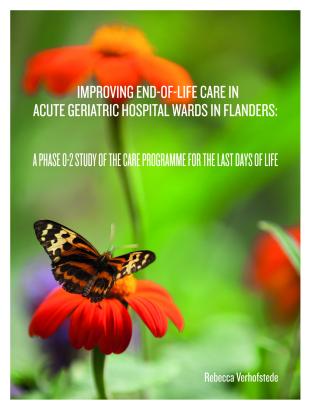Author: Rebecca Verhofstede
Date: 23-11-2015
Promotor: Prof. dr. Luc Deliens and Prof. dr. Nele Van Den Noortgate
Co-Promotor: Prof. dr. Tinne Smets
SUMMARY OF THE DISSERTATION
Background
As populations worldwide are ageing and patterns of diseases in the last years of life are also changing with more people dying from chronic debilitating conditions, the World Health Organization (WHO) has identified palliative care and end-of-life care as one of the public health priorities for older people. While we are aware of a substantial proportion of older people dying in acute geriatric hospital wards, we lack reliable data on what care they receive at the end of life and what the quality of the dying process is. However, acute hospital care for older people is considered to be inadequate to the needs of dying patients. It is of major importance to further expand the existing knowledge about end-of-life care for older people and to develop a new initiative to improve end-of-life care for older people dying in acute geriatric hospital wards.
Methods
To do this we used three robust research methods: 1) death certificate study in Flanders, 2) retrospective cross-sectional descriptive study, and 3) Medical Research Council (MRC) Framework for developing and evaluating complex interventions.
Results
By using these methods, this dissertation gives insight into the type of care that older people of different ages receive at the end of their life, the end-of-life care for patients dying in acute geriatric wards in terms of the performed medical and nursing interventions and the medication policy during the last 48 hours as well as the quality of dying of patients dying in an acute geriatric hospital setting. In addition, this dissertation presents and reflects upon the results of the development and evaluation of the Care Programme for the Last Days of Life to improve end-of-life care for patients dying in acute geriatric wards.
Conclusions
The findings in this dissertation may help us to address important challenges and issues in end-of-life for older people by formulating some important implications for health care staff, policy makers and researchers.

